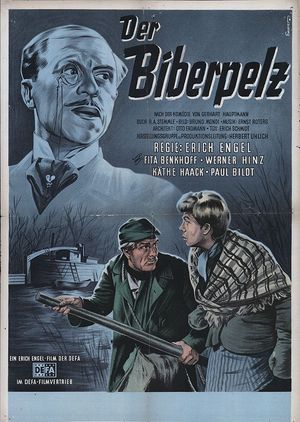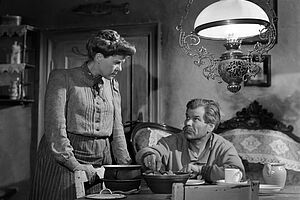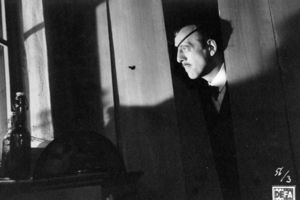Der Biberpelz
Director: Erich Engel, 96 Min., Black-White, Feature Film
Deutsche Demokratische Republik (DDR)
DEFA-Studio für Spielfilme, 1949
- Film/Video Format
- 35 mm
- Length in m
- 2638
- Premiere Date
- Release Date (for Cinema)
- Literary Source
- Hauptmann, Gerhart: "Der Biberpelz", Komödie

(Dir.: Erich Engel, 1949) Graphic Design: Ewert
Short Summary (English)
During the 1880s, the washerwoman Mother Wolffen, who lived on the outskirt of Berlin, didn’t have an easy lot in life. To enable her family - two adolescent daughters and a somewhat slow-witted and taciturn husband - to make ends meet, she slaved away from what dawn and dust. However, Mother Wolffen was a shrewd and cunning person - and as far as other people’s private property was concerned, her fingers could at times be rather sticky. Here and there things disappeared: sometimes a bundle of wood, or quite "by accident” a deer was snared... And so, one fine day it came to pass that pensioner Krüger couldn’t find his valuable beaverskin. In a state of anger, Krüger formally opened up proceedings against the unknown thief with the chief district attorney von Wehrhahn.
But he doesn’t like Krüger. He has, however, an even greater antipathy for the writer Dr. Fleischer and his social democratic ambitions. Von Wehrhahn is a reactionary simpleton and pompous ass; he, however, thinks of himself as a perspicacious judge of human character and a lawyer with astute insights. It is simply out of the question to charge the washerwoman Wolff with larceny! After all, she has frequently lent a helping hand to his wife, and moreover, she is held in high esteem by von Wehrhahn. And so without further ado, the district attorney’s office brings pensioner Krüger into custody, and a search of Dr. Fleischer’s home is conduced. But the swiped fur is not to be found. And while the slandered stridently protest and demand justice, Mother Wolffen goes on with their work. She has no scruples - on the contrary, the next coup has already been planned.
Source: PROGRESS Film-Verleih

(Dir.: Erich Engel, 1949) Photography: Rudolf Brix

(Dir.: Erich Engel, 1949) Photography: Rudolf Brix
Film Crew
- Director
-
- Erich Engel
- Script
-
- Robert A. Stemmle
- Camera
-
- Bruno Mondi
- Film Editing
-
- Lilian Seng
- Cast
-
- Werner Hinz (Amtsvorsteher Friedrich von Wehrhahn)
- Käte Haack (Regina von Wehrhahn)
- Fita Benkhoff (Auguste Wolff)
- Friedrich Gnaß (Julius Wolff)
- Ingrid Rentsch (Leontine Wolff)
- Edith Hancke (Adelheid Wolff)
- Paul Bildt (Wilhelm Krüger)
- Berta Monnard (Adele Krüger)
- Emmy Burg (Frau Motes)
- Erwin Geschonneck (Herr Motes)
- Herbert Wilk (Schriftsteller Dr. Joachim Fleischer)
- Alfred Schieske (Schiffer Wulkow)
- Ilse Trautschold (Frau Wulkow)
- Werner Peters (Gendarm Eberhard Schulz)
- Franz Weber (Amtsdiener Mitteldorf)
- Hans Ulrich (Amtsschreiber Glasenapp)
- Elfie Dugal (geb. Dugall) (Alma)
- Walter Bechmann
- Gisela Breiderhoff
- Gerd Ewert
- Renate Fischer
- Anni Haupt
- Friedrich Honna
- Hedwig Kohlhoff
- Alois Krüger
- Otto Lange
- Erik von Loewis
- Wladimir Marfiak
- Hermann Schechert
- Christine Traute Wiere
- Assistant Director
-
- Zlata Mehlers
- Assistant Camera
-
- Dietrich Wedekind
- Joachim Hasler
- Production Design
-
- Otto Erdmann
- Script Editing
-
- Wolff von Gordon
- Music
-
- Ernst Roters
- Sound
-
- Erich Schmidt
- Costume Design
-
- Walter Schulze-Mittendorff
- Make-Up
-
- Friedrich (auch: Fritz) Havenstein
- Alois Strasser
- Production Management
-
- Herbert Uhlich
- Unit Production Management
-
- Willi Teichmann
- Waldemar Albert
- DEFA Photography
-
- Rudolf Brix
Short Summary (German)
Im Mittelpunkt von Gerhart Hauptmanns Diebeskomödie steht Mutter Wolffen, die in den 1880er-Jahren couragiert für ihre Familie sorgt. Dabei bedient sie sich auch mal ganz ungeniert bei anderen. Als sie den Biberpelz des Nachbarn Krüger entwendet, meldet der den Diebstahl beim Amtsvorsteher von Wehrhahn. Dem kommt die Anzeige wie gerufen, kann er doch endlich gegen Krügers Untermieter, den Schriftsteller Dr. Fleischer, vorgehen. Das "aufwieglerische und königsfeindliche Element" ist ihm schon lange ein Dorn im Auge. Über den besessenen Demokratenjäger von Wehrhahn, der aufgrund seiner Vorurteile nicht den wahren Dieb erkennt, muss sich am Ende sogar Mutter Wolffen wundern.
(Quelle: Das zweite Leben der Filmstadt Babelsberg. DEFA-Spielfilme 1946-1992)
Short Summary (Other Languages)
Protagonista di questa commedia poliziesca di Gerhart Hauptmann, ambientata alla fine degli anni '80 del XIX secolo, è la lavandaia Mutter Wolffen, che pur di provvedere alla sua famiglia, è disposta anche a rubare. Sottrae così una pelliccia di castoro al suo vicino, il sig. Krüger, che denuncia il furto al capo dell'amministrazione. Quest'ultimo, irriducibile cacciatore di spiriti democratici, coglie l'occasione per procedere contro il signor Fleischer, scrittore ribelle e contrario al re, rifiutandosi di inseguire il vero ladro. (Italienisch)



